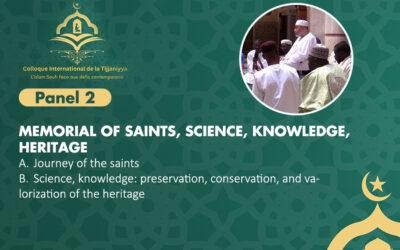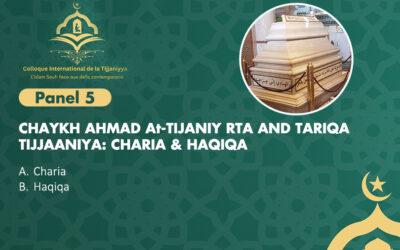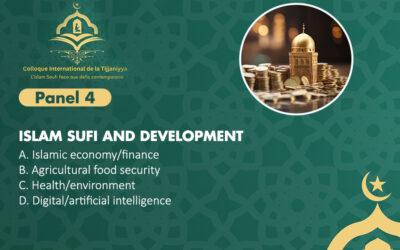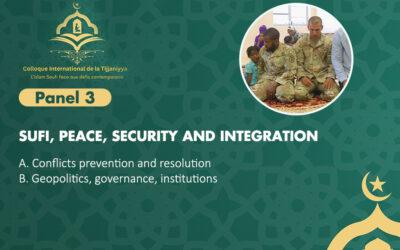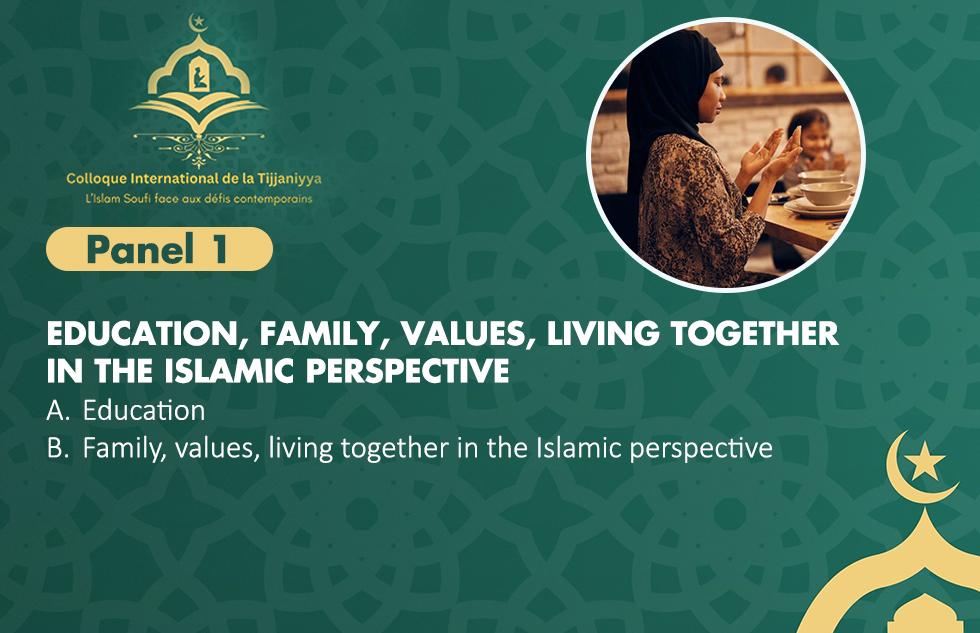
Members of the Technical Committee of Panel 1
Amadou Tidiane Wone, Prof. Abdou Salam Fall, Imam Thierno Saydou Nourou Tall, Prof. Ramatoulaye Diagne Mbengue, Elimane Haby Kane, Imam IGE Bassirou DIOP, Cheikh Mbow, Sokhna Lalla Fall SY, Djibril Seck, Ababacar Abdoulaye Niasse, Prof. Fatou Sow Sarr, Elhadj Ahmed Ndiaye. Souleymane Diamly Wane, Dr. Fatimata Ly, Mame Ousmane Ndiaye, Chérif Boubacar Haydara, Prof. Mounirou SY, Moulaye Abdoul Aziz Diop, Chérif Mahmmoud Haydara, Thierno Boubacar Ahmadou Ibrahima Datt, Ndiamé Diop
EDUCATION IN THE CULTUAL AND CULTURAL CONTEXT OF THE ARAB-MUSLIM WORLD
One of the major causes of planetary disorder is ignorance. The lack of education in the meaning of both knowledge and know-how, know-being and good manners. Traditional family education has lost ground in the face of the increasingly early schooling of children. Captured by the educational system inherited from colonization, generations of African elites became clones of Western subcultures that stripped them of their identities. These elites, however, lead the destiny of most African countries that have achieved independence during the past sixty years. The errors noted in the leadership of young African states are a form of unpreparedness to meet the immeasurable challenges of real economic, social, and above all spiritual and cultural progress!
The work of our colloquium must, in addition to an uncompromising diagnosis of the educational system’s offer, propose bold solutions for a redesign of curricula and the integration, in school curricula, of the scientific and cultural contribution of African writers and scientists. The marginalization of literature written in Arabic by our sages and scholars constitutes an invaluable shortfall in the mental and cultural configuration of our elites. While significant efforts are being made to translate and popularize major works of our intangible heritage, systematization efforts remain to be made to disseminate the thought and action of our scholars throughout the world.
FAMILY, VALUES, LIVING TOGETHER IN THE CULTUAL AND CULTURAL CONTEXT OF THE ARAB-MUSLIM WORLD
“There are four obstacles between the aspirant and the truth: money, the desire for glory, blind imitation and transgression”. Abu Hamid Al-Ghazali.
With the triumph of liberal democracy, we are no longer witnessing the endless race to a production that is no longer regulated by the satisfaction of needs, but driven by the only hope of future gains and the generalization of an all-round consumerist model of society, without limits or discernment. Which sketches a future of destruction rather than abundance. The dominant political-economic model promotes the power of capital, financial rent, individual property, desire and calculating reason in the service of this desire. A vision that ignores inequalities, the referential values of the different social and civilizational worlds, the meaning that social actors give to their actions and their lives, the aspiration to a spirituality that elevates the soul above small, ephemeral and destructive pleasures.
In this logic of the market that seeks to harmonize the world in the mold of a universal spirit favorable to mass consumption, the spiritual values that feed personal ethics and collective morality, guarantee family integrity and social balance, are in crisis. Instead, destructive counter-values of the basic family unit, fraternal solidarity and social cohesion essential to the common will to live together are increasingly erected and promoted.
In the face of this global spiritual and social crisis, tijâniya offers an inexhaustible source of teachings, practices, models, references, and religious tools to prevent humanity from sinking into the abyss and becoming lost. The Sufi way opened by Chaykh Ahmad Al-Tijâni (RTA) is both a legacy and a locomotive that allows contemporary and future generations to experience success on earth and in the afterlife.
Drawing from this fertile breeding ground of a sirat that originates exclusively in the holy Quran and the sunna of Seyyidina Muhammad PSL, without ceasing to consolidate through the multiple contributions and practices of the chaykhs who maintain the path, the symposium will tackle the major challenges of our society, including the preservation of the basic cell that is the family. There is also the question of values, the ethical foundations of a model citizenship, the imperative need for a common will to live together, in diversity and tolerance.
This theme will be animated by a mix of panelists of researchers and practitioners from universities, daaras, civil society, socio-professional organizations, to allow to meet eyes enlightened by the teachings of Master Chaykh Ahmad Al-Tijâni (RTA), his disciples and the Chaykhs of other Sufi obediences who, following him, marked their time by their writings and practices.
SYNTHESIS FOR ACTION: THE PERSPECTIVE OF SUFI ISLAM
During the meeting held on Saturday, August 19, 2023 at the home of Mr. Amadou Tidiane Wone with Imam Prof. Mouhamadou Bassir Diop, Prof. Ramatoulaye Diagne Mbengue, Cheikh Mbow, Cissé Kane, Mame Ousmane Ndiaye, avenues for reflection have been opened to clearly identify the challenges of the time to propose courses of action.
Challenges
Our societies face national and global challenges related to education, learning and its different places. The most urgent challenges seem to us to be the following:
- How to rebuild the dialogue because there is no longer any dialogue?
- How to meet the challenge of compartmentalizing places of learning (school, daara, family, street, Internet, TV and social media, literature);
- Torn, sick society (rudeness, irreverence, trivialized violence, insults, morals);
- Single thinking, thought terrorism;
- The immensity of discharges from the education system;
- The silence of the Islamic world on everything: climate change, political conflicts, domination of the entertainment industry, weapons, lack of a sense of priorities (e.g. sums invested in entertainment including football);
- The widely diagnosed failure of the formal education system (foundations and national dialogue);
- Digital technology and its drifts;
- Lobbies against our worldview and discrediting our thought patterns;
- The changing need for
- How to trade the different places of learning?
- How can efforts converge towards building model citizens?
- When to introduce education to Sufi Islam?
- What lessons can we learn from the journey of the saints to face the challenges of education?
- Secularism
- – Which inclusive school rooted in our best values and what curricula?
- – What are the fundamental values for the harmonious development of man?
- – How to draw inspiration from the system of zawiyas, dahiras and daaras masterfully implemented by the Sufi masters.
Faced with these challenges, the proposed avenues for reflection:
- Islam is a proposal, a guide, a solution: It is opportune to refer to the heritage and the journey of the saints to propose concrete solutions.
- We must break down the walls of partition between the different places of education: go beyond the academic dimension and include all other places of education and learning by affixing the imprint of Islam in general with as concrete examples, the inspired approach of the saints and their journey
- It should be remembered that scholars and saints had the Qur ‘an and the Sunnah as their reference. The Qur ‘an is in motion and always ahead of society. This symposium must truly go beyond the contemplation of the heritage we owe to the saints, to be an opportunity to read our current challenges and provide concrete answers, applicable drawing inspiration from the Qur ‘an, the Sunnah, the writings and the journey of the saints.
- Take an interest in other panels
- Foster creativity and discernment
- Develop the new skills required
- Pedagogy of success
- – What new, inclusive school, rooted in our best cultural and social values?
- – What fundamental values and curricula for the harmonious development of man?
- – How to take advantage of the system of zawiyas, dahiras and daaras that has been masterfully issued by the Sufi masters.
The aim of the colloquium is to achieve, in an inclusive approach, strong concrete resolutions on these issues that will feature prominently in the Dakar Declaration at the end of the colloquium.
Other panels
Panel 2 : MEMORIAL OF SAINTS, SCIENCE, KNOWLEDGE, HERITAGE
Dr. Mamarame Seck, Mandiaye Ndiaye, Dr. Mansour Dia, Lamine BA, Amadou Moustapha Dial, Serigne Maodo Malick Fall, Imam IGE Bassirou DIOP, Babacar Niang, Abdoulaye Niang, Mame Ousmane Ndiaye, Mansour Gaye, Mouhammad Lamine Thioune, Mactar Cissé, Chérif Boubacar...
Panel 5 : THE TARIQA TIJANIY: CHARIA AND HAQIQA
Serigne Mortalla Ndieguène, Cheikh Ababacar Ba Tidjaniy, Khassimou Ka At-Tijaniy, Abdoul Latif Begdouri La Tarîqa Tijaniya en tant que voie spirituelle, sociale et code de conduite arrimés au Coran et à la sounna de Seyyidina Mouhammad PSL a été initiée par le Maitre...
Panel 4 : SUFI ISLAM AND DEVELOPMENT
Cheikh Ahmed Tijane Sy; Bara Diene, Prof. Bachir Wade, Prof. Djibril Fall, Babacar Dramé, Dr. Djim Ousmane Dramé, Mouhammadou Yall, Prof. Mounirou Ndiaye, Elhadj Mohamed Kounta, Dr. Ibrahima Thiam, Chérif Boubacar Haidara, Seykhou Oumar Ndiaye, Sokhna Lalla Fall SY,...
Panel 3 : PEACE, SECURITY & INTEGRATION
Dr. Aoua Bocar Ly Tall, , Dr. Ebrima Sall, Ahmad Boukkar Niang, Prof. Abdoullah Cissé, Dr. Bakary Sambe, Dr. Cheikh Tidiane Gadio Oustaz Babacar Niang, Dr. Mamadou Oumar Dia, Mame Ousmane Ndiaye, Cheikh Ahmed Tijane Touré, Pape Touty Makhtar Sow, Chérif Boubacar...
